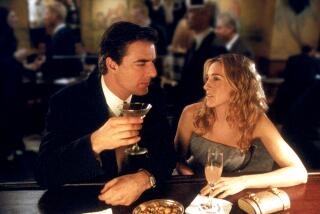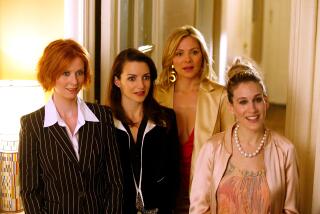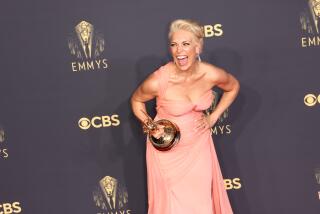From the start, ‘Girls’ carved a unique path — and was scrutinized for its every move
It was the show that launched a thousand opinion pieces. Now, after six tumultuous seasons in which it seems every moment has been analyzed, “Girls” ended with Hannah Horvath unexpectedly packing up and settling down. Played by creator, co-showrunner and often director Lena Dunham, Hannah left the big city for small-town academia to raise her baby, with her best friend Marnie (Allison Williams) on hand to support and irritate her. It was a rather traditional ending to a show that broke with convention from the start — making it fodder for even more dissertations.
“Girls” hit the airwaves in 2012 with a bang. Make that a lot of banging. But this wasn’t the usual male-gaze sex that HBO has been known for. It was awkward, uncomfortable, realistic, often unsexy, and for good reason.
MORE: ‘Girls’ showrunners Lena Dunham and Jenni Konner are sticking together »
“I’d always as a kid seen the sex scenes on TV and felt like, I’m excited to see what that’s like,” Dunham said, looking back on the series a few days after the finale aired. “Then my experience of actually doing it was radically different.”
Adding that she wasn’t the first to depict sex in all its thorny confusion, “I was in a unique position to tell the story of women of a certain age and what sex for them looks like. It might not be what it looks like for everyone, but I felt a few people felt comforted by knowing they weren’t alone in finding the whole thing challenging.”
Sex was just one of the reasons the show became an instant lightning rod. Along with great critical acclaim and a slew of awards, controversy swirled around everything from the cast members’ parentage to Dunham’s body, which she had the audacity to reveal in all its normalcy.
Yes, the show had a lot of nudity. That happens on HBO every now and then. But the emotional nakedness was the show’s real hook. The girls in question were raw and uncensored as they flailed through their post-collegiate years. Through Hannah and her friends (including Zosia Mamet as Shoshanna and Jemima Kirke as Jessa), Dunham commented on a generation in all its hilarious, obnoxious, painful struggle. Only 23 years old when she pitched the show, her work showed a self-awareness that belied her age, regarding an age that has little awareness.
She also acknowledged her own lapses when dealing with legitimate criticism, engaging in conversations about issues such as the show’s all-white cast. “What does going silent say besides, ‘I think I’m above this, and I’m too big an artist to respond,’” she said. “I tried to respond in a thoughtful way, because that’s what being a human is about, learning and growing.”
What I didn’t realize was how unwilling people are to assume that people, especially female creators, are in on their own joke.
— Lena Dunham
Yet much of the vitriol aimed her way managed to conflate the character with the portrayer. She expected the confusion to some extent. “What I didn’t realize was how unwilling people are to assume that people, especially female creators, are in on their own joke,” she said. “Not everybody assumed Carroll O’Connor was Archie Bunker. But when Hannah was this problematic, prickly, complicated, narcissistic figure, it was assumed this was my POV and I was basically in an episode of ‘Real Housewives.’”
She didn’t just get what she calls “sassy reviews.” She received death threats and violent comments about her body, “just for playing this woman on TV.”
Dunham’s response was to focus on the work, for the people who could relate to it. “The reason I got into storytelling in the first place was because I wasn’t a popular kid. I spent a lot of time feeling weird, I spent a lot of time feeling alone. I struggled with mental illness. I just wanted to make something that made people feel like they had a community, and that normal wasn’t the ideal.”
In doing so, Dunham’s work helped clear a path for other shows by funny, bracing female auteurs, including “Broad City,” “Insecure” and “Fleabag.”
Dunham broke out of her own unusual formula with the devastating stand-alone episode “American Bitch,” in which Hannah faces off with a famous author (played by Matthew Rhys) over his behavior with young female fans.
She then took on the most clichéd of plot twists for young women, an unexpected pregnancy, and graced it with earned pathos. On hearing her baby-to-be daddy’s unenthusiastic response to the news, Hannah’s reaction is heartbreaking. She reunites with her Big Love Adam (Adam Driver), falling for his grand pronouncement that he’ll raise the child with her. After a perfect day together, the fantasy falls apart in one moment, without a word spoken between them.
The finale took another surprising turn in its relatively restrained look at the perils of new motherhood. But then, Hannah never followed the expected path to adulthood. However fitfully, she and the other girls are ready to move on, and Dunham is ready to let them go.
Girls, you are women now.
See the most read stories this hour »
More to Read
From the Oscars to the Emmys.
Get the Envelope newsletter for exclusive awards season coverage, behind-the-scenes stories from the Envelope podcast and columnist Glenn Whipp’s must-read analysis.
You may occasionally receive promotional content from the Los Angeles Times.






